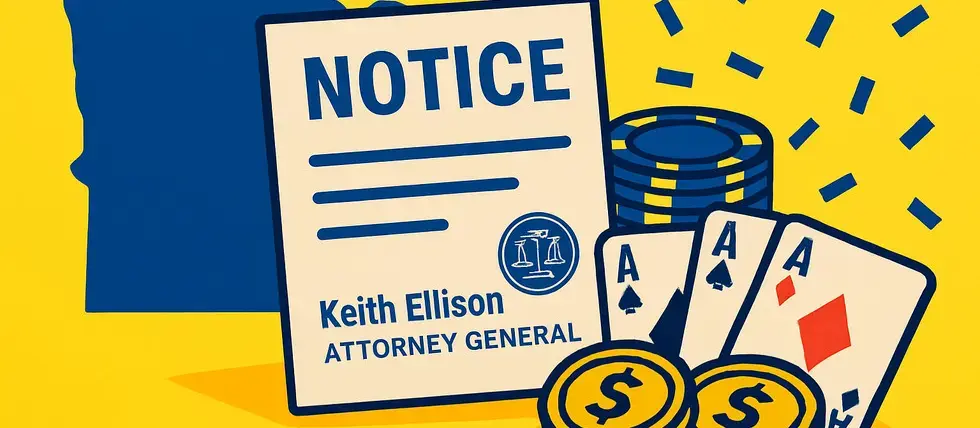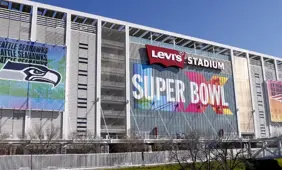Minnesota AG Orders 14 Offshore Gambling Platforms to Stop Serving Residents
Minnesota Attorney General Keith Ellison has notified 14 online gambling platforms that they must stop offering games to state residents or face enforcement action.

Ellison’s office dispatched formal letters this week to a mix of sportsbooks, casino sites and sweepstakes-style operators – including LuckyLand, Zula Casino, FortuneCoins, BetAnySports, Bovada, MyBookie and others – asserting that their activities violate Minnesota gambling and consumer-protection laws. The notices give recipients 10 days to acknowledge the demand in writing and set a hard deadline of December 1, 2025, to withdraw operations from Minnesota.
The letters, two nearly identical templates tailored to different business models, cite Minnesota Statutes §§ 609.75-609.76, § 325F.69 and § 8.31 as the legal basis for action. One version targets traditional offshore sportsbooks and casino sites that accept wagers from Minnesota residents. The other zeroes in on social sweepstakes casinos that use a dual-coin system – typically a mix of “gold” coins for free play and “sweeps” coins that can be redeemed for cash or prizes – which the office says is a thinly veiled form of paid gambling.
Ellison framed the enforcement as a consumer-protection priority. "Online platforms offering sportsbooks and casino games run by out-of-state and overseas operators may make it look as though online gambling is legal and safe in Minnesota, but let me be clear: it is not", he said. "Trying to rebrand poker chips as virtual currencies does not change the fact that these operations are unlawful."
The sweepstakes-targeted letter explains how the two-coin model works and cites historic state case law to argue that the promotional language and coin-redemption mechanics meet Minnesota’s statutory definition of a lottery. The office highlights the common “play for free” messaging as potentially deceptive, arguing it obscures the reality that players are effectively purchasing opportunities to win cash or prizes.
Growing State-Level Pushback
Minnesota’s move is part of a broader, coordinated enforcement trend this year. State regulators and attorneys general in Louisiana – where the Attorney General recently deemed sweepstakes casinos illegal gambling – Mississippi and West Virginia have issued similar cease-and-desist notices, subpoenas, or enforcement warnings to offshore sportsbooks and sweepstakes casinos. Those efforts have led some operators to withdraw from specific states or to pause certain promotional models as officials scrutinize whether virtual-coin packages constitute unlawful gambling.
In West Virginia, for example, state authorities opened investigations early in 2025 and reported that more than twenty platforms subsequently exited the jurisdiction over consumer-protection and underage gambling concerns. In Louisiana and Mississippi, joint actions by regulators and attorneys general named several of the same brands now targeted by Minnesota.
Legal outcomes remain uncertain. Operators could comply and cease activity in Minnesota, negotiate a resolution with the Attorney General’s office, or contest the interpretation of state law in court. Enforcement would likely focus on injunctive relief and potential civil penalties, with consumer restitution possible if investigators find evidence of deceptive practices.
More Regulation News
Expert Views on Enforcement Strategy
A gaming compliance attorney who reviewed the Minnesota letters said the office is pursuing a classic prosecutorial approach: "By relying on existing gambling and consumer statutes and anchoring claims to decades-old case law, the state is aiming to remove any ambiguity about the core legal question – whether virtual-coin schemes are a form of gambling. That legal framing makes it easier to seek rapid injunctive relief." The attorney spoke on the condition of anonymity to discuss forthcoming litigation strategies.
Independent observers say the coordinated state pressure could prompt rapid business changes. "Operators that have relied on sweepstakes mechanics for market access now face a choice: modify products to remove cash redemption, restrict by state, or litigate", said an industry analyst who follows online gaming policy. "Expect litigation in the near term, but also faster exits from smaller states as operators reassess compliance risk."
For Minnesota consumers, the immediate effect will likely be reduced access to the named platforms from December 1 unless operators comply or obtain a court order allowing continued operation. The Attorney General’s action adds another chapter to an unfolding national debate over how digital sweepstakes and offshore betting sites are regulated and policed at the state level.
RELATED TOPICS: Regulation
Most Read
BETBY Launches Always-On Virtual American Football and Expanded Bet Builder Markets
Feb 04, 2026Must Read
 Interviews
Interviews
Exclusive Interview: Levon Nikoghosyan Shares AffPapa Winning Formula for Successful iGaming Events
Dec 03, 2025 Interviews
Interviews








Review this New Post
Leave a Comment
User Comments
Comments for Minnesota AG Orders 14 Offshore Gambling Platforms to Stop Serving Residents